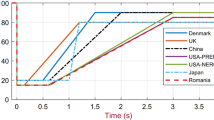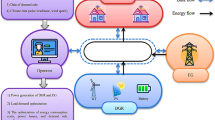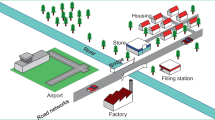Abstract
Optimal scheduling of multi-microgrids is one of the important tasks in multi-microgrid operations as it is an effective way to enhance operational and economic performance. However, with the presence of varied distributed dispatchable and non-dispatchable generation and loads in different microgrids make the optimal scheduling very challenging. This paper presents a cross-layer optimal energy scheduling (CLOES) mechanism in a multimicrogrid system, covering different elements of a community in a smart city such as industry, commercial/office, single residence and multi-dwelling unit with their varied nature of distributed generations and loads. The cross-layer sequential coordinated operations are performed between two layer i.e. lower and upper layer. The lower layer consists of different microgrids, whereas the upper layer comprises distribution system operator. The cross-layer sequential interactions between upper and lower layer lead to an optimal energy scheduling for each microgrid which is essential for the reliability of a multi-microgrid system. The importance of internal and external trading prices is described in a unique way for energy trading in a multi-microgrid system. The simulation result and discussions show the effectiveness of the proposed CLOES in terms of cost reduction in a multi-microgrid system compared to the independent external trading of each individual microgrid with the utility grid.











Similar content being viewed by others
Abbreviations
- DG:
-
Distributed generation
- DERs:
-
Distributed energy resources
- PV:
-
Photovoltaics
- EMS:
-
Energy management strategy
- DSO:
-
Distribution system operator
- RES:
-
Renewable energy resources
- CHP:
-
Combined heat and power
- MCCA:
-
Microgrid central controller agent
- ESS:
-
Energy storage system
- EV:
-
Electric vehicle
- SOC:
-
State of charge
- MILP:
-
Mixed integer linear programming
- UG:
-
Utility grid
- MG:
-
Microgrid
- MMG:
-
Multimicrogrid system
- \(E_{t}^{CHPmin}\) :
-
Min production of CHP at t
- \(E_{t}^{CHPmax}\) :
-
Max production of CHP at t
- \(C_{t}^{CHP}\) :
-
Energy production cost in CHP
- \(\lambda _{t}^{GBP}\) :
-
Grid buying price
- \(\lambda _{t}^{GSP}\) :
-
Grid selling price
- \(\lambda _{t}^{MBP}\) :
-
Microgrid buying price
- \(\lambda _{t}^{MSP}\) :
-
Microgrid selling price
- \(E_{t}^{PVI}\) :
-
PV energy production in industry
- \(E_{t}^{PVSR}\) :
-
PV energy production in single-residence
- \(E_{t}^{PVMU}\) :
-
PV energy production in multi-dwelling Unit
- \(L_{t}^I\) :
-
Load demand in industry
- \(L_{t}^C\) :
-
Load demand in commercial building
- \(L_{t}^{SR}\) :
-
Load demand in single-residence
- \(L_{t}^{MU}\) :
-
Load demand in multi-dwelling MG
- \(\eta _{c}\), \(\eta _{d}\) :
-
Charging and discharging Efficiency
- \(E_{t}^{ESS,max}\) :
-
Max energy capacity of ESS
- \(E_{t}^{ESS,min}\) :
-
Min energy capacity of ESS
- \(E_{t}^{ESSmax,ch}\) :
-
Max charging power
- \(E_{t}^{ESSmax,dis}\) :
-
Max discharging power
- \(t_i\) :
-
Time slot/interval
- \(p_t^c\) :
-
Preference value for charging
- \(p_t^d\) :
-
Preference value for discharging
- \(E_{t}^{CHP}\) :
-
Energy production amount by CHP
- \(E_{i,t}^{D}\) :
-
Deficit energy of ith MG
- \(E_{i,t}^{S}\) :
-
Surplus energy of ith MG
- \(E_{t}^{ID}\) :
-
Deficit energy of industrial MG
- \(E_{t}^{CD}\) :
-
Deficit energy of commercial MG
- \(E_{t}^{SRD}\) :
-
Deficit energy of single-residence MG
- \(E_{t}^{MUD}\) :
-
Deficit energy of multi-dwelling Unit MG
- \(E_{t}^{IS}\) :
-
Surplus energy of industrial MG
- \(E_{t}^{SRS}\) :
-
Surplus energy of single-residence MG
- \(E_{t}^{MUS}\) :
-
Surplus energy of multi-dwelling unit MG
- \(E_{i,t}^{M,Sell}\) :
-
Selling energy amount of ith MG to other MG
- \(E_{i,t}^{Sell}\) :
-
Selling energy amount of ith MG to UG
- \(E_{i,t}^{M,Buy}\) :
-
Buying energy amount of ith MG from MG
- \(E_{i,t}^{Buy}\) :
-
Buying energy amount of ith MG from UG
- \(E_{t}^{ESSC,ch}\) :
-
Charging energy in commercial building
- \(E_{t}^{ESSC,dis}\) :
-
Discharging energy in commercial building
- \(E_{t}^{EV,ch}\) :
-
Charging energy in EV
- \(E_{t}^{EV,dis}\) :
-
Discharging energy in EV
- \(E_{t}^{ESSMU,ch}\) :
-
Charging energy in multi-dwelling unit
- \(E_{t}^{ESSMU,dis}\) :
-
Dis-charging energy in multi-dwelling unit
- \(u_t^{ESS}\) :
-
Binary variable if ESS is charging
References
Adusumilli BS, Raj V, Boddeti KK (2018) Modified affine arithmetic-based power flow analysis with uncertainty. Electr Power Comp Syst 46(6):728–737
Alharbi W, Raahemifar K (2015) Probabilistic coordination of microgrid energy resources operation considering uncertainties. Electr Power Syst Res 128:1–10
Vaccaro A (2015) Affine arithmetic for power and optimal power flow analyses in the presence of uncertainties. PhD thesis, http://hdl.handle.net/10012/9307
Bui VH, Hussain A, Kim HM (2018) A multiagent-based hierarchical energy management strategy for multi-microgrids considering adjustable power and demand response. IEEE Trans Smart Grid 9(2):1323–1333
Carreiro AM, Jorge HM, Antunes CH (2017) Energy management systems aggregators: a literature survey. Renew Sustain Energy Rev 73:1160–1172
Cintuglu MH, Mohammed OA (2015) Multiagent-based decentralized operation of microgrids considering data interoperability. In: Smart grid communications (SmartGridComm), 2015 IEEE international conference on, IEEE, pp 404–409
Timbus A, Larsson M, Yuen C (2009) Active management of distributed energy resources using standardized communications and modern information technologies. IEEE Trans Ind Electron 56(10):4029–4037
Colson CM, Nehrir MH, Sharma RK, Asghari B (2014) Improving sustainability of hybrid energy systems part ii: managing multiple objectives with a multiagent system. IEEE Trans Sustain Energy 5(1):46–54
De Leone R, Giovannelli A, Pietrini M (2017) Optimization of power production and costs in microgrids. Optim Lett 11(3):497–520
Eddy YF, Gooi HB, Chen SX (2015) Multi-agent system for distributed management of microgrids. IEEE Trans Power Syst 30(1):24–34
Erdinc O, Paterakis NG, Mendes TD, Bakirtzis AG, Catalão JP (2015) Smart household operation considering bi-directional ev and ess utilization by real-time pricing-based dr. IEEE Trans Smart Grid 6(3):1281–1291
Funde N, Dhabu M, Deshpande P, Patne NR (2018) Sf-oeap: starvation-free optimal energy allocation policy in a smart distributed multi-microgrid system. IEEE Trans Ind Inform 14:4873–4883
Jadhav AM, Patne NR (2017) Priority-based energy scheduling in a smart distributed network with multiple microgrids. IEEE Trans Ind Inf 13(6):3134–3143
Jin X, Wu J, Mu Y, Wang M, Xu X, Jia H (2017) Hierarchical microgrid energy management in an office building. Appl Energy 208:480–494
Khan MW, Wang J, Ma M, Xiong L, Li P, Wu F (2018) Optimal energy management and control aspects of distributed microgrid using multi-agent systems. Sustain Cities Soc 44:855–870
Khodaei A (2014) Resiliency-oriented microgrid optimal scheduling. IEEE Trans Smart Grid 5(4):1584–1591
Liu N, Chen Q, Liu J, Lu X, Li P, Lei J, Zhang J (2015) A heuristic operation strategy for commercial building microgrids containing EVS and PV system. IEEE Trans Ind Electron 62(4):2560–2570
Liu N, Yu X, Wang C, Li C, Ma L, Lei J (2017) Energy-sharing model with price-based demand response for microgrids of peer-to-peer prosumers. IEEE Trans Power Syst 32(5):3569–3583
Loccioni Group I (2019) Leaf community. Available at https://www.loccioni.com/en/waves/leaf-community
Mao M, Jin P, Hatziargyriou ND, Chang L (2014) Multiagent-based hybrid energy management system for microgrids. IEEE Trans Sustain Energy 5(3):938–946
Marzband M, Alavi H, Ghazimirsaeid SS, Uppal H, Fernando T (2017) Optimal energy management system based on stochastic approach for a home microgrid with integrated responsive load demand and energy storage. Sustain Cities Soc 28:256–264
Mbungu NT, Bansal RC, Naidoo R, Miranda V, Bipath M (2018) An optimal energy management system for a commercial building with renewable energy generation under real-time electricity prices. Sustain Cities Soc 41:392–404
Mohammadi S, Soleymani S, Mozafari B (2014) Scenario-based stochastic operation management of microgrid including wind, photovoltaic, micro-turbine, fuel cell and energy storage devices. Int J Electr Power Energy Syst 54:525–535
Mohan V, Suresh R, Singh JG, Ongsakul W, Madhu N (2017) Microgrid energy management combining sensitivities, interval and probabilistic uncertainties of renewable generation and loads. IEEE J Emerg Select Top Circ Syst 7(2):262–270
Monacchi A, Elmenreich W (2016) Assisted energy management in smart microgrids. J Ambient Intell Hum Comput 7(6):901–913
Najafi-Ghalelou A, Zare K, Nojavan S (2018) Optimal scheduling of multi-smart buildings energy consumption considering power exchange capability. Sustain Cities Soc 41:73–85
Niknam T, Azizipanah-Abarghooee R, Narimani MR (2012) An efficient scenario-based stochastic programming framework for multi-objective optimal micro-grid operation. Appl Energy 99:455–470
Olivares DE, Cañizares CA, Kazerani M (2014) A centralized energy management system for isolated microgrids. IEEE Trans Smart Grid 5(4):1864–1875
Park S, Lee J, Bae S, Hwang G, Choi JK (2016) Contribution-based energy-trading mechanism in microgrids for future smart grid: a game theoretic approach. IEEE Trans Ind Electron 63(7):4255–4265
Ren L, Qin Y, Li Y, Zhang P, Wang B, Luh PB, Han S, Orekan T, Gong T (2018) Enabling resilient distributed power sharing in networked microgrids through software defined networking. Appl Energy 210:1251–1265
Romero-Quete D, Cañizares CA (2018) An affine arithmetic-based energy management system for isolated microgrids. IEEE Trans Smart Grid 10(3):2989–2998
Saber AY, Venayagamoorthy GK (2012) Resource scheduling under uncertainty in a smart grid with renewables and plug-in vehicles. IEEE Syst J 6(1):103–109
Sandgani MR, Sirouspour S (2018) Priority-based microgrid energy management in a network environment. IEEE Trans Sustain Energy 9(2):980–990
Sattarpour T, Nazarpour D, Golshannavaz S (2018) A multi-objective hem strategy for smart home energy scheduling: a collaborative approach to support microgrid operation. Sustain Cities Soc 37:26–33
Siano P, Graditi G, Atrigna M, Piccolo A (2013) Designing and testing decision support and energy management systems for smart homes. J Ambient Intell Hum Comput 4(6):651–661
Silvente J, Papageorgiou LG (2017) An milp formulation for the optimal management of microgrids with task interruptions. Appl Energy 206:1131–1146
Song NO, Lee JH, Kim HM, Im YH, Lee JY (2015) Optimal energy management of multi-microgrids with sequentially coordinated operations. Energies 8(8):8371–8390
US Energy Information Administration (2018) How the United States uses energy. https://www.eia.gov/energyexplained
Vaccaro A, Canizares CA (2016) An affine arithmetic-based framework for uncertain power flow and optimal power flow studies. IEEE Trans Power Syst 32(1):274–288
Vaccaro A, Cañizares CA, Bhattacharya K (2012) A range arithmetic-based optimization model for power flow analysis under interval uncertainty. IEEE Trans Power Syst 28(2):1179–1186
Vaccaro A, Petrelli M, Berizzi A (2019) Robust optimization and affine arithmetic for microgrid scheduling under uncertainty. In: 2019 IEEE international conference on environment and electrical engineering and 2019 IEEE industrial and commercial power systems Europe (EEEIC/I&CPS Europe), IEEE, pp 1–6
Zhao B, Shi Y, Dong X, Luan W, Bornemann J (2014) Short-term operation scheduling in renewable-powered microgrids: a duality-based approach. IEEE Trans Sustain Energy 5(1):209–217
Author information
Authors and Affiliations
Corresponding author
Ethics declarations
Conflict of interest
The authors have declared no conflict of interest.
Ethical approval
This paper not conducted any studies on human or animal any by authors.
Additional information
Publisher's Note
Springer Nature remains neutral with regard to jurisdictional claims in published maps and institutional affiliations.
Rights and permissions
About this article
Cite this article
Funde, N., Dhabu, M. & Deshpande, P. CLOES: cross-layer optimal energy scheduling mechanism in a smart distributed multi-microgrid system. J Ambient Intell Human Comput 11, 4765–4783 (2020). https://doi.org/10.1007/s12652-020-01745-1
Received:
Accepted:
Published:
Issue Date:
DOI: https://doi.org/10.1007/s12652-020-01745-1




